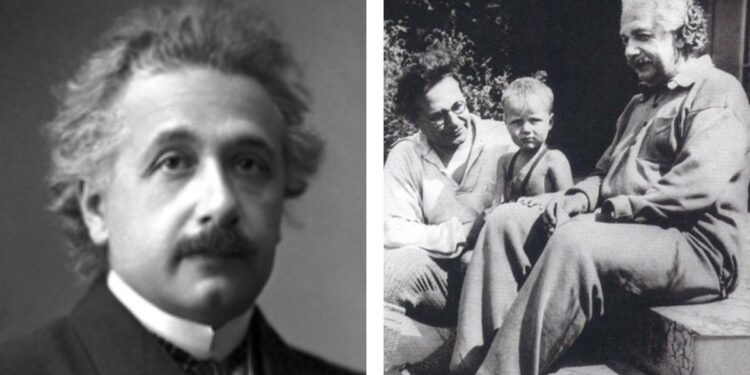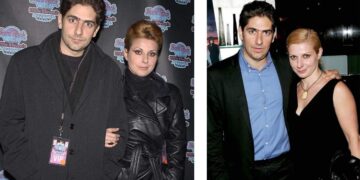When we think of the Einstein family, the image of Albert Einstein, the brilliant theoretical physicist and father of modern physics, inevitably comes to mind. His contributions to science, particularly the theory of relativity, catapulted him into a realm of intellectual fame that has never been equaled. Yet, behind this towering figure was a family — children, grandchildren, and a legacy that extended beyond the realm of physics. One such lesser-known member of this family is Klaus Martin Einstein, the son of Hans Albert Einstein and the grandson of Albert Einstein. While he never achieved the public acclaim of his grandfather, Klaus Martin Einstein lived a life that was deeply affected by the burdens and brilliance of the Einstein legacy.
QUICK BIO
| Category | Details |
| Full Name | Klaus Martin Einstein |
| Date of Birth | 1932 |
| Place of Birth | United States |
| Parents | Hans Albert Einstein (Father), Frieda Einstein (Mother) |
| Grandfather | Albert Einstein |
| Siblings | Bernhard Caesar Einstein, David Einstein, Evelyn Einstein |
| Nationality | American |
| Ethnicity | Jewish-German Descent |
| Education | Limited information available |
| Profession | Not widely documented |
| Known For | Being the son of Hans Albert Einstein and grandson of Albert Einstein |
| Cause of Death | Health-related issues (exact details unknown) |
| Year of Death | 1939 |
The Einstein Lineage: From Albert to Hans Albert
To understand who Klaus Martin Einstein was, it is crucial to trace the Einstein lineage. Albert Einstein had three children with his first wife, Mileva Marić: Lieserl, Hans Albert, and Eduard. Lieserl, the firstborn daughter, either died young or was given up for adoption, with her fate still shrouded in mystery. Eduard, the youngest son, struggled with mental illness for much of his life. The most stable and accomplished of the three was Hans Albert Einstein, a renowned hydraulic engineer and professor who made significant contributions in the field of civil engineering.
Hans Albert Einstein moved to the United States in the 1930s to escape the rise of the Nazi regime in Germany. He became a professor at the University of California, Berkeley, and built a respectable career. He married Frieda Knecht, and together they had four children, including Klaus Martin Einstein. While Hans Albert tried to keep his family grounded despite the weight of their surname, the challenges were inevitable.
The Birth of Klaus Martin Einstein: A New Generation

Klaus Martin Einstein was born on March 15, 1932, in Dortmund, Germany. He was the second son of Hans Albert and Frieda. At the time of his birth, the family was preparing for life in a new world as they soon moved to the United States to avoid the growing unrest in Europe. Klaus’s early years were marked by transition and resettlement, as his family adjusted to a different culture and language. As the grandson of Albert Einstein, Klaus was born into a world of expectation, and though he was just a child, the Einstein name carried immense social weight even in his formative years.
Growing up in the United States during the 1930s and 1940s, Klaus was raised in a highly intellectual environment. His father was a professor, and his grandfather was a global icon. The family valued education, intellectual debate, and discipline. While Albert Einstein had a distant but affectionate relationship with his grandchildren, his busy life meant that most of the day-to-day parenting was left to Hans Albert and Frieda.
A Promising Start: Education and Early Life
From an early age, Klaus Martin Einstein exhibited signs of intelligence and curiosity. He attended good schools, and by all accounts, he was a bright and diligent student. Hans Albert ensured that all his children received a robust education, much like the one he himself had received. Klaus followed in the family tradition of academic excellence, and there were hopes that he might pursue a career in science or engineering, much like his father and grandfather.
However, unlike his older brother, Bernhard Caesar Einstein, who later became a physicist, Klaus’s life was tragically cut short before he could fully realize his potential. Nonetheless, his upbringing and early years are worth noting, as they reflect the immense pressure and high standards that were often placed upon children in famous families. Klaus was expected to uphold a legacy that was both a source of pride and an inescapable burden.
The Einstein Burden: Struggles With Expectations and Identity

Being an Einstein came with both privilege and pressure. While the name opened doors and granted opportunities, it also came with the expectation of brilliance and public scrutiny. Klaus Martin Einstein was acutely aware of the heritage he carried, and it’s believed that this awareness may have contributed to emotional strain. The comparison to his legendary grandfather was likely an ever-present shadow, especially during adolescence when self-identity begins to form.
It’s also important to consider the context of the times. Klaus was a teenager during the post-war period, a time of great change in America. Adjusting to life in a new country, navigating societal shifts, and coping with the unique psychological pressures of his lineage would have been difficult for any young man. Although there is limited public documentation about Klaus’s personal struggles, those close to the family have hinted at the emotional toll that came from growing up under such an iconic surname.
A Tragic End: The Death of Klaus Martin Einstein
Klaus Martin Einstein’s life came to a tragic and abrupt end. In 1948, at just 16 years old, Klaus died from diphtheria, a bacterial infection that, at the time, could still be deadly despite the growing use of vaccines. The illness reportedly worsened due to complications following surgery, possibly a throat operation, which allowed the infection to spread.
The loss of Klaus was devastating to the Einstein family. Hans Albert was deeply affected by the death of his son, and Albert Einstein, though often seen as emotionally distant, expressed sorrow over the loss of his grandson. It’s said that Albert, despite his complicated relationships with his children and family, mourned Klaus’s death with profound grief. In private letters, Albert referred to Klaus’s passing as a cruel blow to the family.
Legacy Left Behind: What Klaus Martin Einstein Represents

Although Klaus Martin Einstein died young and did not have the opportunity to build a career or family of his own, his life holds symbolic significance within the Einstein family narrative. His story is a reminder that fame and genius do not shield a family from tragedy. Klaus’s death also marked a generational turning point, a moment when the Einstein family, once rooted in Europe and steeped in academic tradition, was fully transplanted to American soil but still carried the weight of historical upheaval and familial grief.
In a broader sense, Klaus’s life — short though it was — represents the often unseen personal costs of legacy and expectation. While the world saw Albert Einstein as a symbol of intellectual triumph, his private life was fraught with pain, including the sorrow of losing his grandson. Klaus Martin Einstein is remembered not for the things he achieved, but for the poignant reminder of what was lost — a life full of potential that ended far too soon.
Einstein Descendants: What Happened After Klaus
The Einstein family continued through Klaus’s siblings. His older brother, Bernhard Caesar Einstein, went on to become a successful physicist and had five children of his own. Bernhard’s descendants have kept a relatively low profile, but some have occasionally appeared in public, maintaining the family’s legacy through quiet contributions to science and education.
Interestingly, despite Albert Einstein’s global recognition, very few of his descendants have pursued high-profile public lives. Many have chosen to live in relative anonymity, distancing themselves from the expectations tied to the Einstein surname. Klaus Martin Einstein, while not well-known to the public, is an important part of this lineage — a quiet figure whose memory lives on in family archives and historical biographies.
Honoring Klaus Martin Einstein Today

Although not many tributes or public memorials exist in Klaus Martin Einstein’s name, his story has not been entirely forgotten. Biographies of Albert Einstein often mention Klaus briefly, and academic works that explore Einstein’s personal life touch on the tragedy of his grandson’s death. Scholars and fans of Einstein’s legacy sometimes reflect on Klaus’s story as a part of the human side of genius — the side not visible in equations or Nobel Prizes, but in letters, tears, and gravesites.
There is also a growing interest in exploring the personal histories of prominent figures and their families, giving rise to a more compassionate and complete understanding of historical icons. Klaus Martin Einstein’s brief life is a poignant chapter in the Einstein saga, and remembering him helps paint a fuller picture of what it meant to be part of one of the most famous families in history.
Conclusion: A Name, A Legacy, A Human Story
In the annals of history, Klaus Martin Einstein might only occupy a footnote, but that footnote is important. He was a child born into extraordinary circumstances, carrying a legacy he barely had time to comprehend. His life serves as a lens into the human side of the Einstein dynasty — a reminder that behind every famous name are families who love, grieve, and carry on in the face of joy and sorrow alike.
Though he did not publish papers or receive awards, Klaus Martin Einstein’s life — short and tragic — remains a testament to the unseen stories of those born in the shadow of greatness. In honoring his memory, we acknowledge not only who Klaus was but also the family he was part of, and the legacy that continues to influence the world.
Frequently Asked Questions (FAQs)
1. Who was Klaus Martin Einstein?
- Klaus Martin Einstein was the son of Hans Albert Einstein and the grandson of Albert Einstein. He was born in 1932 and died tragically at the age of 16 in 1948 due to diphtheria complications.
2. What was Klaus Martin Einstein known for?
- While Klaus Martin Einstein did not have a public career due to his young death, he is known as part of the Einstein family and is remembered for his tragic passing and the emotional impact it had on his family.
3. How did Klaus Martin Einstein die?
- He died from diphtheria at the age of 16, which worsened after surgery complications. At that time, diphtheria could still be fatal despite emerging treatments.
4. Was Klaus Martin Einstein close to Albert Einstein?
- While not much is publicly known about their relationship, Albert Einstein reportedly mourned Klaus’s death deeply and referred to it as a personal tragedy in private letters.
5. Are there living descendants of the Einstein family today?
- Yes, Klaus’s brother Bernhard Caesar Einstein had five children, and some of Albert Einstein’s great-grandchildren are alive today, though they live relatively private lives.


















